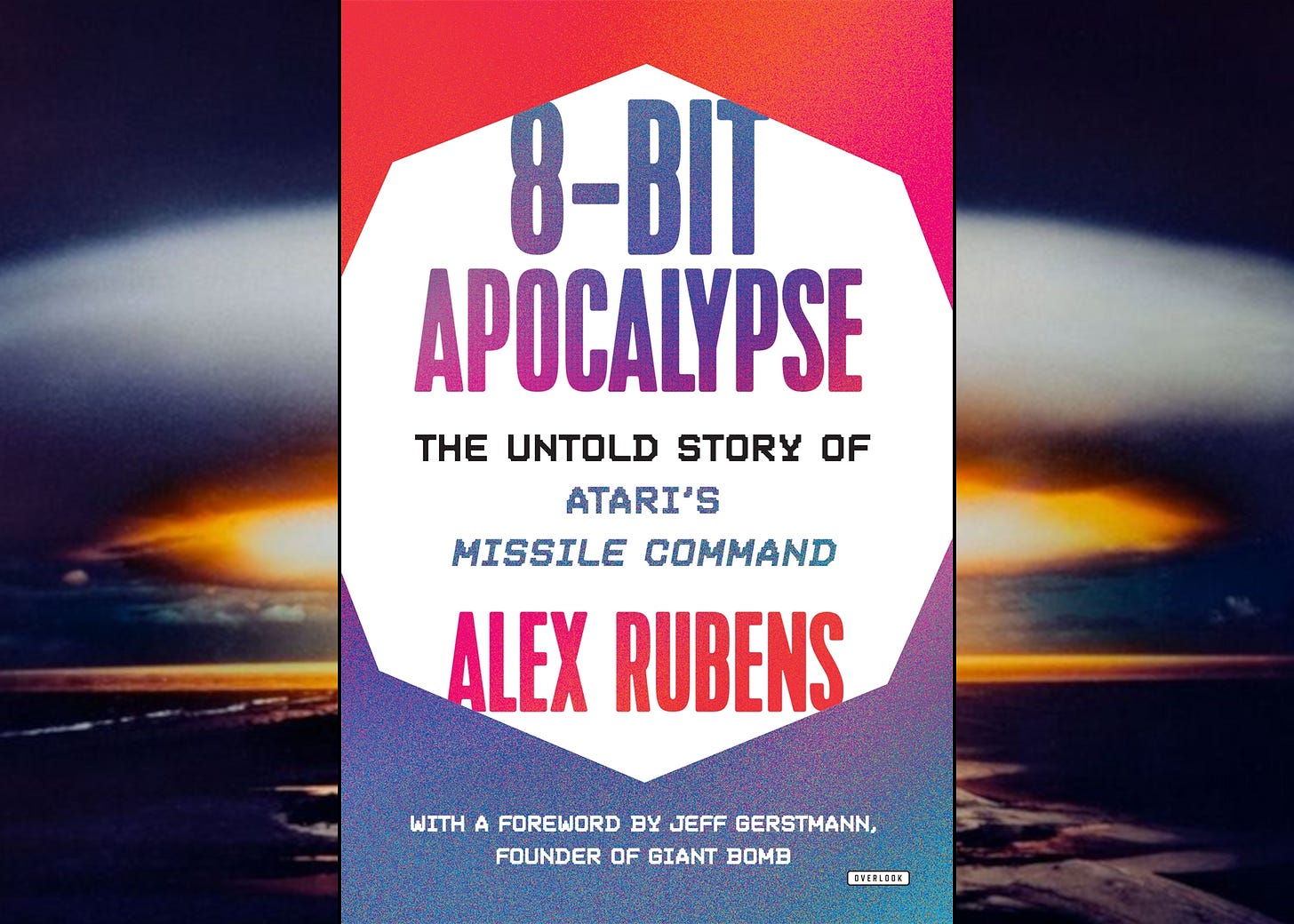David Theurer is a rarity: a legendary game designer who shuns publicity. After creating Missile Command, Tempest, and A.P.B. he changed careers and disappeared off the face of the Earth.
Alex Rubens, obsessed with Missile Command from the age of five, made it his mission in life to track down Theurer and learn the secrets behind one of the most iconic arcade games of the early 1980s.
8-Bit Apocalypse is the result, and it's one of the worst books I've ever read. There is no hearty feast of content here; rather a handful of grainy stock cubes of data diluted into a thin gruel. What should've been a 2,000 word magazine article has been kneaded and stretched out to book length.
“This was the late 1970s, early 1980s. The world was covered in a shroud of nuclear war. Would it happen? Who knew, but the thought alone was scary enough. No one could be trusted, not even computers.”
Rubens spends an entire chapter explaining what the Cold War was, and why people in the 1970s and 1980s feared nuclear destruction. He spends Chapter 2 recounting the oft-retold legend of the founding of Atari and its weed-fuelled early days under Nolan Bushnell. Chapter 3 describes the unusual freedoms enjoyed by the programmers of Atari's coin-op division, and their penchant for late nights and drug abuse.
Only in Chapter 4 does Rubens get around to the history of Missile Command, but he doesn't start by describing the game. He simply assumes the reader is already intimately familiar with Missile Command and its distinctive design; a jarring transition. It's not until page 81 that 8-Bit Apocalypse gets to its main topic. It's not until page 91 that we actually get a quote from Theurer.
Rubens's writing is neither vigorous nor concise. He repeats himself. He meanders. He indulges in simile; in analogy. He repeats himself. His low-energy writing style makes reading a chore. He may care a great deal about Missile Command, but he does a miserable job of instilling any interest in the reader.
“It needed 1980, and 1980 needed it.”
If you can wade through the endless paragraphs of purple prose, you'll gain a few skerricks of insight into what Theurer was trying to accomplish. Instead of explicitly protecting America from Soviet missiles, you were defending a nameless nation from a nameless enemy. Theurer wanted a game where the player did not exact any retribution; he merely defended his homeland. Theurer set out to create a game where setbacks and utter defeat were inevitable, to truly convey the horror and futility of global thermonuclear war. He succeeded. Rubens tried to make these facts interesting to a casual reader. He failed.

And the grand, ultimate truth, the shocking revelation that we're told is worthy of a book-length treatise? Theurer had nightmares. During the six months or so it took to develop his most ground-breaking arcade game, Dave Theurer had vivid, horrid dreams of nuclear war. That's it. That's the big reveal. The way that dream imagery can affect a creative person's work is certainly an interesting topic, but I was expecting more.
Rubens's writing style is breezy and cavalier, and he plays fast and loose with the facts. At one point he casually remarks that the UK was far removed from the front lines of the Cold War. This is patently false; at one point there were over 70,000 British troops stationed in West Germany to deter Soviet aggression. When rattling off pop-culture references to Missile Command, Rubens states that Terminator 2: Judgement Day was set in the year 1984. It was actually set in the year 1994. I'm not convinced that he proof-read his own book.
There's a chapter near the end describing how after decades of (relative) world peace, the West is now staring down the barrel of a new Cold War, this time with North Korea. Rubens claims that Kim Jong Un's regime is a 'more powerful enemy' than the USSR, a laughable assertion. At its peak, the Soviet nuclear stockpile numbered over 45,000 warheads. North Korea has maybe 100 – nowhere near enough for a decapitation strike on the United States. The notion that North Korea could challenge the US is a fantasy. Meanwhile, here in the real world, rumours are swirling that Putin's Russia has used a tac-nuke to take out Ukraine's stockpile of depleted uranium ammunition. World War III may have already started! This book was first published in 2018; the geopolitical analysis in 8-Bit Apocalypse is already woefully out of date.
There are eight pages of colour plates, including five blurry pictures of the Missile Command game. In one photo the author is seen posing next to a Missile Command arcade cabinet at his wedding. Why? Did he marry it?
“Spec Ops: The Line asks us, 'Do you feel like a hero now?' I would say that such a word isn't strong enough to characterize Dave Theurer.”
I paid AU$10 for a discounted copy of 8-Bit Apocalypse in hardback from the Clearance section of Dymocks; an impulse purchase. The mass market paperback is now available for AU$24.99. This is not a good deal. The chapter describing the antics of the disgraced former Missile Command World Champion 'Mr. Awesome' is quite entertaining, but I don't feel it justifies the sticker price.
There are far, far better books about the video game industry available: Commodore: The Inside Story, Ask Iwata, Control Freak, and On The Edge, to name a few.
About the most charitable thing I can say about 8-Bit Apocalypse is that reading it is less agonising than death by radiation poisoning. I cannot recommend this book.













